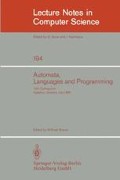Abstract
Logical proof systems for concurrent programs are notoriously complex, often involving arbitrary restrictions. One of the main reasons for this is that unlike other major programming concepts parallelism does not appear to have a logical correlate. Using a simple semantic strategy we tentatively propose one and offer an example compositional modal proof theory for a subset of Milner's CCS. The proof rules are reminiscent of Gentzen introduction rules except that there are also introduction rules for the combinators of CCS.
This work was supported by the Science and Engineering Research Council of the U.K.
Preview
Unable to display preview. Download preview PDF.
References
S. Abramsky ‘Experiments, powerdomains and fully abstract models for applicative multiprogramming’ LNCS Vol. 158 pp. 1–13 (1983).
K. Apt, N. Francez and W.de Roever ‘A proof system for communicating sequential processes’ TOPLAS pp. 359–385 (1980).
H. Baringer, R. Kuiper and A. Pnueli ‘Now you may compose temporal logic specifications’ CS84-09, Dept. of Applied Maths, Weizmann Institute of Science (1984).
S. Brookes and W. Rounds ‘Behavioural equivalence relations induced by programming logics’ LNCS Vol. 154, pp. 97–108 (1983).
R. de Nicola and M. Hennessy ‘Testing equivalences for processes’ in LNCS Vol. 154 pp. 548–560 (1983).
E. Emerson and J. Halpern 'sometimes and not never revisited: on branching versus linear time’ pp. 127–140 POPL Proceedings (1983).
G. Gentzen ‘Investigations into logic deduction’ in ‘The Collected Works of Gerhard Gentzen’ ed. Szabo, North-Holland (1969).
S. Graf and J. Sifakis ‘A modal characterization of observational congruence on finite terms of CCS', LNCS Vol. 172 pp. 222–234 (1984).
D. Harel ‘First-Order Dynamic Logic’ LNCS Vol.68 (1979).
C. Hoare, S. Brookes and A. Roscoe ‘A theory of communicating sequential processes', Technical Monograph Prg-16, Computing Lab, University of Oxford (1981).
M. Hennessy and R. Milner ‘Algebraic laws for nondeterminism and concurrency’ Technical Report CSR-133-83 (and to appear in JACM) (1983).
C. Hoare ‘A model for communicating sequential processes'. Technical Monograph, Prg-22, Computing Lab, University of Oxford (1982).
M. Hennessy and C. Stirling ‘The power of the future perfect in program logics’ LNCS Vol. 176 pp. 301–311 (1984).
R. Keller ‘A fundamental theorem of asynchronous parallel computation’ in Parallel Processing ed. T. Feng, Springer-Verlag (1975).
L. Lamport ‘The ‘Hoare logic’ of concurrent programs’ Acta Informatica pp. 21–37 (1980).
K. Larsen ‘A context dependent equivalence between processes’ This volume.
G. Levin and D. Gries ‘A proof technique for communicating sequential processes’ Acta Informatica pp. 281–302 (1981).
R. Milner ‘A Calculus of Communicating Systems’ LNCS Vol. 92 (1980).
R. Milner ‘A modal characterisation of observable machine-behaviour’ LNCS Vol. 112, pp. 25–34 (1981).
R. Milner ‘Calculi for synchrony and asynchrony’ Theoretical Computer Science, pp. 267–310 (1983).
E. Moore ‘Gedanken-experiments on sequential machines’ in ‘Automata Studies’ ed. C. Shannon and J. McCarthy, Princeton University Press, pp. 129–153 (1956).
Z. Manna and A. Pnueli ‘How to cook a temporal proof system for your pet language’ POPL Proceedings pp. 141–154 (1983).
S. Owicki and D. Gries ‘An axiomatic proof technique for parellel programs I’ Acta Informatica pp. 319–340 (1976).
D. Park ‘Concurrency and automata on infinite sequences’ LNCS Vol.104 (1981).
G. Plotkin ‘A structural approach to operational semantics'. Lecture Notes, Aarhus University (1981).
J. Queille and J. Sifakis ‘Fairness and related properties in transition systems — a temporal logic to deal with fairness’ Acta Informatica 19, pp. 195–220 (1983).
J. Sifakis ‘A unified approach for studying the properties of transition systems', Theoretical Computer Science, pp. 227–258 (1982).
J. Sifakis ‘Property preserving homomorphisms of transition systems’ Technical Report, IMAG (1982).
C. Stirling ‘A proof theoretic characterization of observational equivalence’ in Procs. FCT-TCS Bangalore (1983). (To appear in TCS).
C. Stirling ‘A complete modal proof system for a subset of SCCS’ To appear in CAAP '85.
G. Winskel ‘On the composition and decomposition of assertions'. Tech. Report 59, Computer Laboratory, University of Cambridge (1985).
G. Winskel ‘A complete proof system for SCCS with modal assertions'. To appear.
J. Zwiers, A. de Bruin and W. de Roever ‘A proof system for partial correctness of dynamic networks of processes’ Technical Report RUU-CS-83-15, Dept. of Computer Science, University of Utrecht (1983).
Author information
Authors and Affiliations
Editor information
Rights and permissions
Copyright information
© 1985 Springer-Verlag Berlin Heidelberg
About this paper
Cite this paper
Stirling, C. (1985). A complete compositional modal proof system for a subset of CCS. In: Brauer, W. (eds) Automata, Languages and Programming. ICALP 1985. Lecture Notes in Computer Science, vol 194. Springer, Berlin, Heidelberg. https://doi.org/10.1007/BFb0015773
Download citation
DOI: https://doi.org/10.1007/BFb0015773
Published:
Publisher Name: Springer, Berlin, Heidelberg
Print ISBN: 978-3-540-15650-5
Online ISBN: 978-3-540-39557-7
eBook Packages: Springer Book Archive

